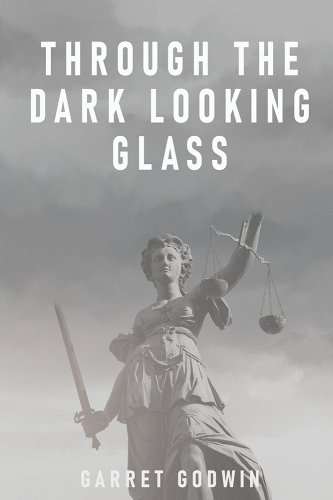Title: Through the Dark Looking Glass
Author: Garret Godwin
Publisher: Authors’ Tranquility Press
ISBN: 978-1956480450
Pages: 250
Genre: Literary Thriller
Reviewed by: Liz Konkel
Pacific Book Review
Ira’s life is complicated. He didn’t get promoted to District Attorney which resulted in his wife leaving him. Following the loss of his marriage, he begins questioning his life when he realizes he has become part of a power-obsessed ploy that has his boss in the center. Working as assistant DA, Ira struggles with his beliefs as he finds himself facing the Military Commissions Act, Patriot Act, and the Violent Radicalization and Homegrown Terrorism Act. As he grows closer to his co-worker Carol, he begins to see the hypocrisy surrounding him. Feeling hopeless in their fight, the two make a drastic change in their lives to fight for the civil rights of others which puts them up against Ira’s former boss and sends Ira onto the case of Jeremy Lufkin while undergoing a spiritual transformation.
The opening takes you directly into Ira’s current state of mind through how he compares himself to his ex-wife who is living her best and even starting her day gloriously. This sets up his journey by first allowing you to understand where he started with a juxtaposition between Ira’s life described as miserable and the resentfulness in his tone about his ex being happier than him. This comparison creates a thread which eventually turns into Ira opening his eyes to the power obsession and hypocrisy within his job. A consistent element within the story is his relationship with Carol. Their relationship is a blend of romance and partnership which is rooted in the trust they share and how they begin to rely on each other. His high opinion of her and respect between them allows each to become allies, thus shifting Ira’s perspective dealing with the Christian Zionist movement, Military Commissions Act, and Patriot Act.
Beginning with a lost man following a divorce, turns into a man’s journey in questioning life, religion, belief, and politics. The tone is rooted in a running retrospection on humanity from Ira’s perspective as he questions everything in life such as religion, cosmic consciousness, good and bad, and behavior of others. Ira consistently becomes lost in his thoughts with poignant moments, such as Ira spying from his apartment and finding shock in the human depravity in his new neighborhood. When the story starts, Ira is lost and it feels as if he’s disconnected in a way from humanity, but as events progress he begins to find solace in what he can achieve to benefit the world. The writing style is rooted in sophisticated literary phrasing such as the post-mortem analysis of his marriage, the cup of good and evil going round as the Earth turns, and rejoining the sea of humanity.
Various catalysts are incorporated which cause his shift in perspective, such as his divorce causing his standard of living to drop thus giving him a dose of reality. By the end of the story the tone shifts into one that is more hopeful as Ira’s perspective has the same shift, believing better times were to come. At the center of Ira’s retrospection and internal commentary is the case of Jeremy Lufkin who is a personification of the various themes addressed. He’s facing interrogation by the CIA, allegations that he was aiding a foreign enemy, and failing to share intelligence with the USA. This case creates suspense and conflict for Ira in his new role as a civil rights lawyer as the plot delves into his struggle to determine if Jeremy is guilty, where the evidence came from, and if some bigger conspiracy is occurring.
Through the Dark Looking Glass tackles complicated themes regarding religion, military, and government with a retrospection on humanity and poignant a literary style.


